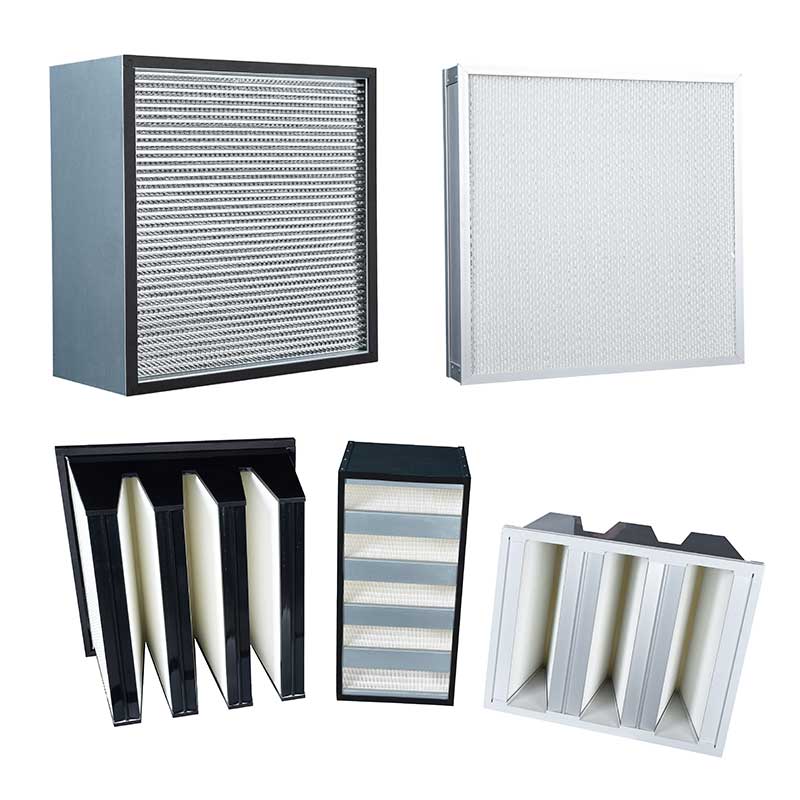 July 11, 2023
July 11, 2023
A HEPA (High-Efficiency Particulate Air) filter in a hospital operating room refers to a filtration device used to filter out bacteria, viruses, dust, and other particulate matter in indoor air, ensuring strict cleanliness requirements for indoor air quality. The main function of the filter is to remove airborne particles and suspended substances, such as dust or other contaminants, to keep the indoor air clean and maintain a sanitary medical environment in the operating room.

A HEPA filter in a hospital operating room refers to the device used for air filtration within the operating room. Its main purpose is to filter out airborne bacteria, viruses, and other harmful substances, ensuring good air quality in the operating room and reducing the risk of postoperative infections. The following are the filter components included in a hospital operating room HEPA filter:
1. Pre-filter: A pre-filter is used for the initial filtration of air. This type of filter effectively removes large particles with a diameter of 10 micrometers or larger, such as dust, fibers, and human skin flakes, to prevent them from clogging the HEPA filter.
2. Medium-efficiency filter: A medium-efficiency filter can effectively filter particles with a diameter between 0.5 and 10 micrometers, such as pollen, dust, smoke, some bacteria, and fungi. Its filtration efficiency can reach 80% to 90%.
3. HEPA filter: The HEPA filter is the core component of air purification in a hospital operating room. It has a filtration efficiency of up to 99.99% and can filter out ultrafine particles with a diameter of 0.3 micrometers and super-fine bacteria. HEPA filters are typically made of electrostatically charged fiber materials, and their filtration principle relies on the electrostatic charge to capture particles on the surface of the material.
4. Activated carbon filter: There are some gas pollutants in the operating room that are difficult to filter, such as formaldehyde, benzene, chlorine gas, etc. These substances can be harmful to human health when inhaled into the respiratory system. Therefore, activated carbon filters are used to adsorb and decompose harmful gases, ensuring fresh air in the operating room.
Hospital operating room HEPA filters mainly include pre-filters, medium-efficiency filters, HEPA filters, and activated carbon filters. Through the function of these filters, they can ensure clean and fresh air in the operating room and reduce the risk of postoperative infections.
What are the classifications of hospital operating room HEPA filters?
Hospital operating room HEPA filters can be classified according to different criteria, including:
1. Classification based on the filter's filtration level: HEPA filters and ULPA filters.
2. Classification based on the installation type of the filter: roof-mounted filters and wall-mounted filters.
3. Classification based on the air flow of the filter: positive-pressure filters and negative-pressure filters.
4. Classification based on the environmental conditions: high-temperature and high-humidity filters, and low-temperature and low-humidity filters.
What are the key points for purchasing hospital operating room HEPA filters?
The key points for purchasing hospital operating room HEPA filters mainly include the following:
1. The filter must have a filtration efficiency of 99.97% or higher.
2. The filter should have good stability and durability, with a long service life and resistance to damage.
3. The design of the filter should meet the specific needs of the operating room and be adaptable.
4. The maintenance and upkeep of the filter should be convenient and not disrupt the normal operation of the operating room.
What is the replacement cycle for hospital operating room HEPA filters?
The replacement cycle for hospital operating room HEPA filters is usually a comprehensive replacement before each surgery. If multiple surgeries are performed consecutively, the filter should be replaced immediately after each surgery.
Common failures and troubleshooting methods?
Common failures of hospital operating room HEPA filters include filter damage and fan malfunctions. In the case of filter damage, the filter should be replaced immediately. For fan malfunctions, prompt repairs or replacement of faulty components are necessary. In addition, routine use and maintenance should be carried out, including regular cleaning and replacement of filters, to ensure proper operation of the filter.
In summary, hospital operating room HEPA filters are important equipment for maintaining medical environmental hygiene. Their selection, use, maintenance, and management should be carried out by professionals to ensure stable and reliable performance of the filtration system and better safeguard the safety and health of patients in hospitals.

